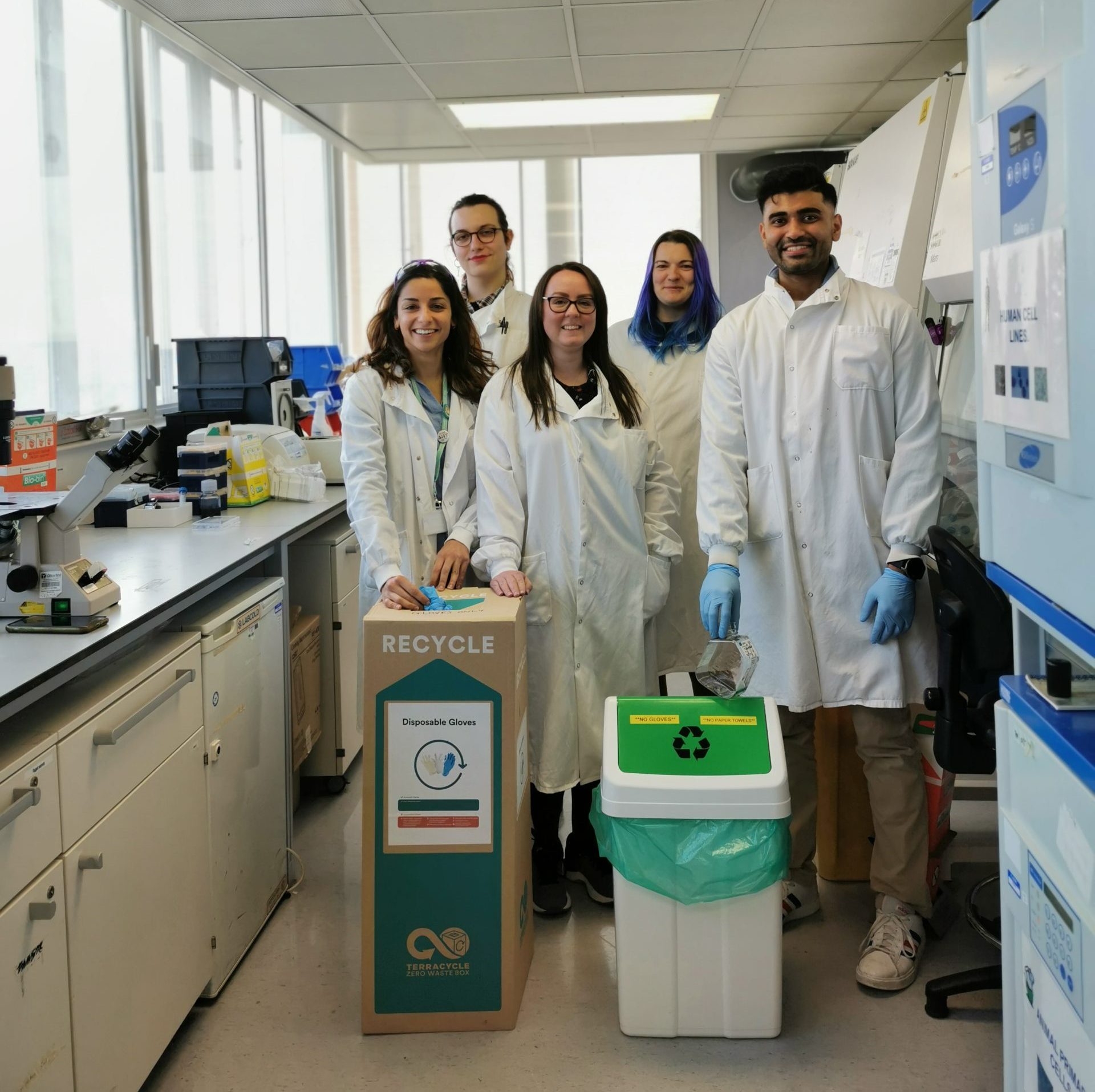
As part of our Staff Profile series, we are celebrating the Green Team in the Centre for Inflammatory Disease. Through their hard work and efforts the team has been recently awarded a Silver LEAF award. In this profile, they tell us more about their work to achieve the award and more about life in our labs.
Introduce yourself – who are you and what do you do?
The Green Team is made up of a mixture of students, PIs, Postdocs and technical staff:
Alice Denton (Senior Lecturer), Lyndon Costa (PhD student), Kassandra (Kass) Vezyrgianni (Research Technician), Stacey McIntyre (Postdoctoral Researcher), Christina Malaktou (Postdoctoral Researcher) and is led by Kerry Rostron-Barrett (Laboratory Manager and Section Safety Coordinator).
What experience does the team have and where did the members work/study before joining the department?
Prior to joining Imperial Alice conducted Postdoctoral work at the Babraham Institute in Cambridge. Lyndon studied at the University of Exeter before joining us for his PhD studies. Christina studied at King’s College before successfully completing her PhD with us and becoming one of our Postdoctoral Researchers.
Before joining us as Research Technician, Kass completed her MRes at the University of York. Stacey previously studied at the University of Oxford and is currently close to completing her PhD submission alongside working as one of our Postdoctoral Researchers.
And finally, prior to joining the department Kerry worked in several Postdoctoral Research positions and spent a year as a Research Scientist in industry.
Recently the labs were awarded a Silver LEAF award. What does this mean?
Laboratory-based research, though essential, is extremely energy and resource intensive, using 3-10 times more energy per meter squared than a typical office. The Laboratory Efficiency Assessment Framework (LEAF) is a standard to improve the sustainability and efficiency of laboratory spaces.
Participating laboratories are awarded either Bronze, Silver or Gold level, depending on how many sustainability actions they take. After achieving Bronze, we were quickly able to make further changes in the labs to be upgraded to Silver.
Our Silver award recognises that we have gone beyond the minimum standard in Lab sustainability. As an entire Centre, we have implemented further additional actions which have resulted in a significant reduction in the amount of laboratory waste generated, consumption of single use plastics, water and energy – ultimately resulting in markedly reduced running costs and carbon footprint.
How did you prepare for the LEAF assessment? What was the process?
After registering our interest in the LEAF programme, we received the LEAF user guide and created an account via the online portal.
Here we completed an online workbook addressing a range of different criteria: waste, people, purchasing, equipment, IT, sample & chemical management, research quality, ventilation and water.
A few examples of some of changes we made in the labs include: increasing the temperature of our ULT freezers from -80°C to -70°C, making recycling bins available in the labs so that used non-contaminated lab plastics could be recycled instead of being disposed of as hazardous waste, developed a standard operating procedure (SOP) for plasticware washing so that single use plastics could be reused for non-sterile applications, order consolidation to reduce the number of consumable deliveries to site and traffic light stickers on equipment highlighting what can/cannot be turned off at the end of each working day.
After submitting our application, we then had an in person visit from Imperials Sustainability Initiatives Coordinator, Ben Gray, who assessed the labs based on our written application and took photographs to evidence what had been implemented.
What is the most challenging part of your role?
There is a common theme here with each one of us – and that is managing wide ranging day to day tasks simultaneously (without messing any of them up!).
On the sustainability side of things, we all agree that the most challenging aspect has been changing old habits among everyone working in the labs. For example, it is just muscle memory for many people to throw lab plastics into the same bin they always have done, rather than recycling them.
And the most rewarding?
The most rewarding aspects range from watching teams flourish as scientists to finding the answers to the scientific questions being asked!
When it comes to being Green – when we see people recycling/turning off lights in the lab without being prompted and knowing that our collective carbon footprint is significantly reducing with the implementation of simple measures to re-use and recycle lab materials.
What are the interesting hobbies or activities the team get up to when not at work?
When the team aren’t at work, the members engage in numerous activities including pottery, mixed martial arts, yoga, video gaming, reading about mythology, playing bass guitar and hanging out with theirs or other people’s pets. Oh! And the occasional pub quiz, of course!!
And finally, what would you love people in the department to know about the team?
We love being green – which I guess helps with our participation in the LEAF, My Green Lab and, more recently, Green Impact programmes!
We’re also very friendly (honest!) come and ask us stuff! We don’t bite, just recycle!